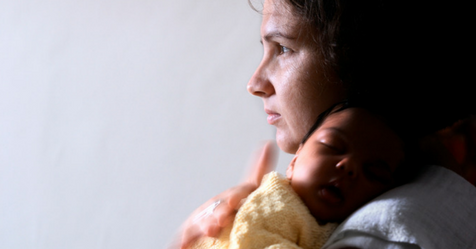|
You’re a new mum. You hear it said often: “It’s normal to feel anxious” – but is it? Clinical Psychologist, Dr Renée Miller from the Antenatal & Postnatal Psychology Network, talks to Bubba West about postnatal anxiety. All new mothers experience some anxiety. Let’s face it, you're in a new role, arguably the most important one there is. You’ve never cared for an infant full-time before. This vulnerable baby depends on you for his or her physical and emotional safety (which can be particularly challenging if your own childhood was not physically or emotionally safe). And on top of all that, you are on call 24 hours a day in a body that has been through significant hormonal changes. You are sleep deprived and you are adapting to a multitude of changes in your life.
So yes, some anxiety is ‘normal’. In fact, we need a certain amount of anxiety – ‘optimal anxiety’ – to be motivated to function well, to solve problems as they arise, and in a primal sense, to keep physically safe from predators (what is known as the ‘fight-flight’ response in our biological wiring). In motherhood, this translates to having a certain amount of anxiety to be vigilant enough to keep our babies safe, to perform the many tasks involved in caring for our babies, and to prepare or plan for future possibilities (eg. an upcoming feed or nappy change). But what happens when this vigilance turns into hyper-vigilance? What happens when a feeling of impending doom creeps in, a feeling of dread, a constant fear that something bad is around the corner? You notice a sick feeling in the stomach, a knot in the chest, heart palpitations, constant worry, exhaustion but you feel too ‘wired’ to sleep, or worse - intense panic. These feelings are not ‘normal’. These feelings suggest that anxiety is no longer optimal, but has become a problem. And anxiety like this can be debilitating. Most people know about postnatal depression – feelings of sadness, negative thinking, tearfulness, loss of pleasure, lack of motivation, hopelessness, and/or dark thoughts. Health practitioners are therefore more likely to ask whether you are feeling sad or blue than to ask if you are feeling unduly anxious or agitated. However, postnatal anxiety is common and can occur alongside postnatal depression or on its own. My research showed that 10% of new mums were anxious or stressed, but were not in fact depressed. This finding means that if we focus on depression as the only mental health problem in the postnatal period, women who experience problematic levels of anxiety may not recognise the problem, and may not be helped appropriately. It is not uncommon for postnatal anxiety to be minimised as a ‘normal’ experience of new mothers – both by health practitioners and by new mums themselves. Recognizing the extent of postnatal anxiety, PANDA recently changed its focus from postnatal depression to postnatal anxiety and depression - now known as Perinatal Anxiety and Depression Australia. If you are feeling worried, fearful, panicky, uptight, overwhelmed, or having obsessive thoughts, you may be experiencing postnatal anxiety. If you are constantly worrying about things that could go wrong in the future (‘what if’ thoughts), you may be experiencing postnatal anxiety. If you are distressed by your anxious feelings and your symptoms are interfering with your life (eg. avoiding going out, not sleeping, obsessively checking on your baby, seeking constant reassurance from others), you may be experiencing postnatal anxiety. It is important to talk about these feelings. You can begin by calling PANDA for free, confidential telephone counselling (ph. 1300 726 306). You can talk with your Maternal and Child Health Nurse, your GP, or a psychologist who is experienced in treating women in the postnatal period. Everyone’s experience of postnatal anxiety differs. However generally speaking, counselling for postnatal anxiety involves:
In some cases (and in consultation with your GP or a perinatal psychiatrist) medication might be required alongside talking therapy. Remember, not all anxiety is normal for new mums, and help is available. Written by Dr Renée Miller for Bubba West, Edition 4 Comments are closed.
|
AuthorPosted by Dr Renée Miller Topics
All
|
|
We acknowledge and pay respects to the Elders and Traditional Owners of the land on which our psychologists practise.


 RSS Feed
RSS Feed

